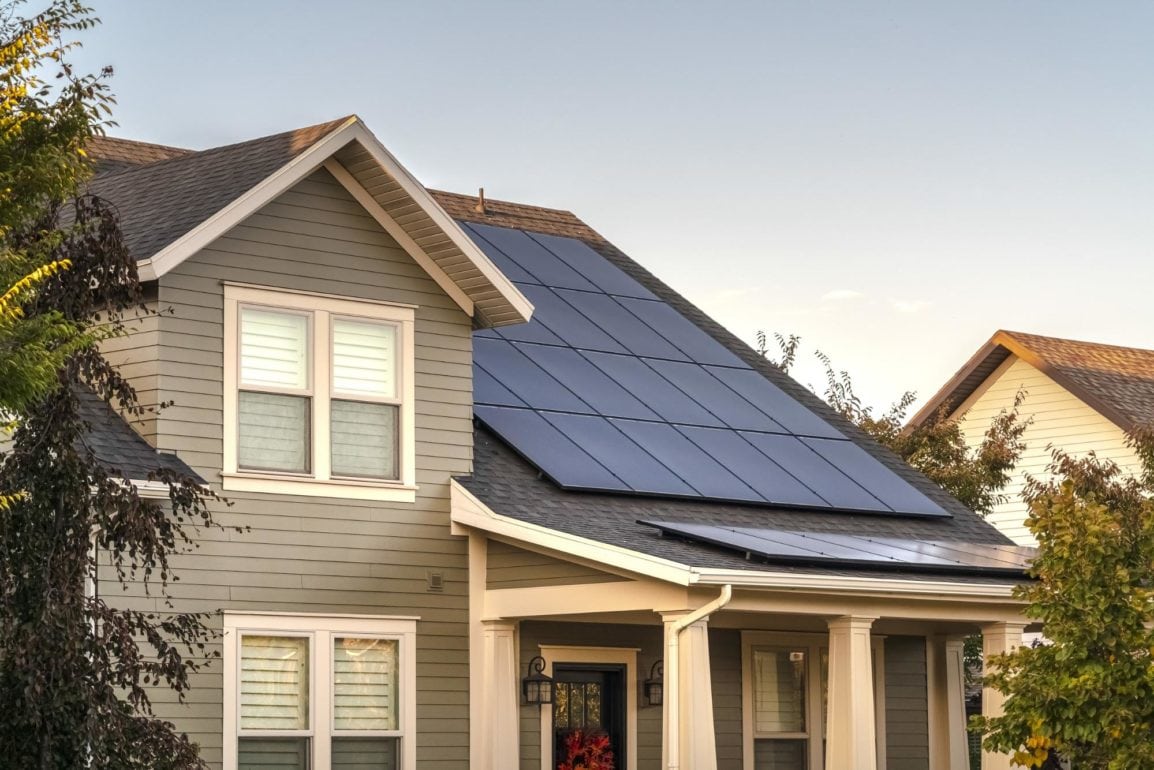There is a lot of information and things to decide on when considering to invest in solar panels for your house. Before you make a decision make sure you have all the right information on what solar panels are best for your home. In this article, we go over the top questions homeowners have when looking into solar energy.
How much do solar panels cost for an average home?
The average cost of a solar panel system ranges from $2.51 to $3.31 per watt. Depending on how much electricity your home uses, the cost of your system will be reflected in the total price.
How do solar panels work?
Solar panels work by letting photons released by the sun knock electrons free from atoms, which is what generates electricity. Solar panels are made of many smaller photovoltaic cells that generate direct current electricity (DC). To convert the direct current electricity into alternating current electricity (AC), allowing your home to use this energy, a solar inverter will also be installed.
How much can solar panels save?
Depending on how much you spend on electricity your savings can vary. The average home can save anywhere between $10,000 to $30,000 over the lifetime of your solar panel system.
Is it better to lease or buy solar panels?
Depending on your financial situation leasing or buying might make more sense for you.
Buying solar panels, although costly up front, will give you the maximum electric bill savings over the life of the system. Unlike leasing, buying solar panels allows you to benefit from the federal solar tax credit and other local solar incentives.
A solar panel lease allows you to avoid the upfront costs of installing solar, but will not provide you with more savings over the lifetime of the system and you won’t be able to benefit from various tax incentives. Another option to avoid the large upfront costs of installing a solar system is to take out a zero-down solar loan. Financing a system allows you to maximize your lifetime savings and allows you to benefit from the tax incentives.
How long do solar panels last?
Solar panels often come with a brand warranty that can range from 25-30 years. Nevertheless, many solar panel systems outlive their warranty.
Kilowatt (kW) vs. kilowatt hour (kWh)
kW stands for kilowatt. A kilowatt is 1,000 watts, which is a measure of power.
A kilowatt hour (kWh) is a measure of how much energy you’re using. Knowing what your kilowatt hour usage is can help you understand:
- How your energy supplier works out your bills
- Why some appliances use much more gas or electricity than others – and how much individual appliances use
- Why you should turn appliances off at the wall to save energy costs, and not just leave them on standby
Are solar panels worth it for my house?
Depending on the location of your home, the amount of electricity your home uses, and the local prices of residential solar systems, solar panel systems can be a great investment.
The average payback period for a residential solar system is about 7 years. With a 7 year payback period, your return on investment would be approximately 14%.
What are the best panel types?
The top-selling home solar panel brands include:
- SunPower X series panels
- LG Neon panels
- Panasonic HIT series panels
When looking for a reliable solar panel brand homeowners can trust that Tier 1 solar panel brands will be the most reliable as opposed to Tier 2 or 3 brands.
Who are the best panel manufacturers?
The top solar panel manufacturers include:
- SunPower
- LG
- Panasonic
- Jinko 390
There are many other manufactures on the market that are a great choice. AM Sun Solar will source any panel a customer is interested in using for their home. Make sure to consider all of your solar options before choosing a large brand name. Many smaller solar companies offer better prices for the same quality.
Is panel efficiency important?
Efficiency refers to how much energy can be generated from a certain amount of sunlight. Solar panel efficiency is taken into account when rating the power output of a panel so if you are comparing two very similar solar panels, but one boasts that it has higher efficiency, they will actually both produce the same amount of power one will just be smaller in size.
What are the different types of solar systems?
Grid-tied
Grid-tied systems are the most common system on the market. These systems are made up of rooftop solar panels that produce DC power combined with inverters that convert the power into AC power. These systems do not provide backup power if the grid goes down.
Hybrid Systems
A hybrid system is very similar to a grid-tied system but they also include a battery to store excess energy. If there is a grid outage, this system will provide backup power. This is a great choice if you live in an area where there are frequent power outages.
Off-grid
Off-grid solar systems are not connected to the public electric grid. These systems are typically more expensive than other options since you need more solar panels and energy storage to ensure all of your electricity usage is covered.
If you have more questions about solar panels for your home, give us a call at (805) 457-4068 or contact us at hello@amsunsolar.com.

